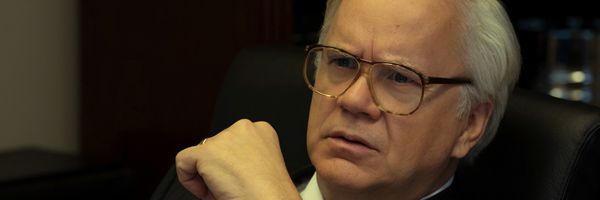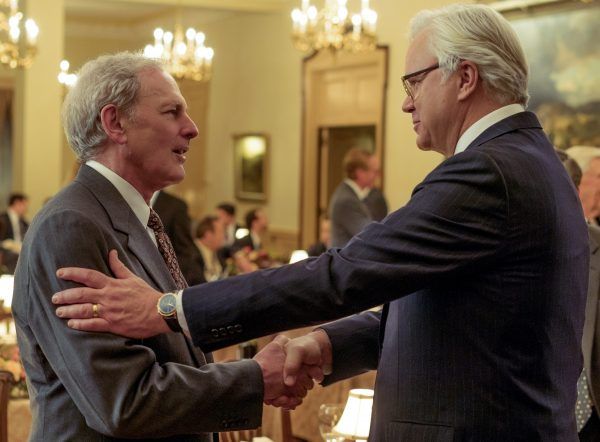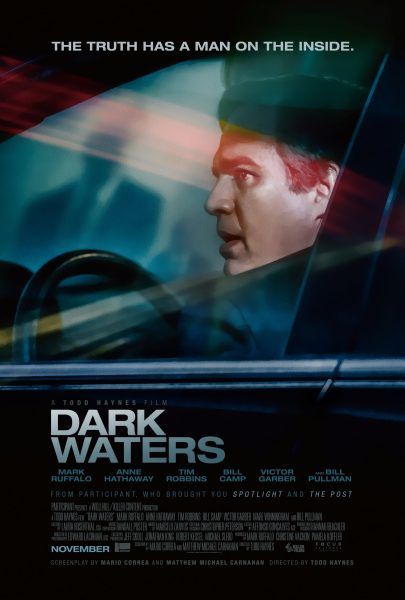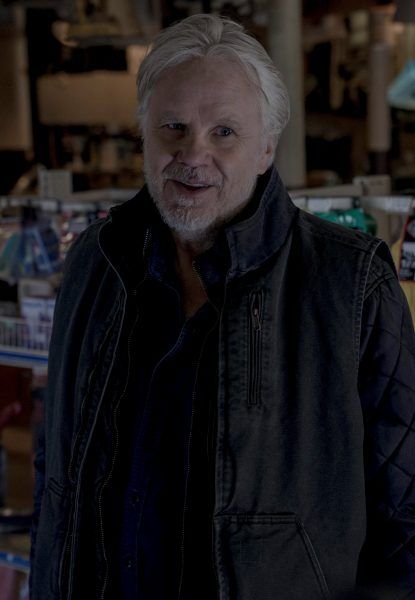From director Todd Haynes, the drama Dark Waters tells the story of corporate environmental defense attorney Rob Bilott (Mark Ruffalo, who’s also a producer on the film), who risked his career and family to expose the actions of DuPont and their dumping of toxic waste in an area landfill in West Virginia and the affects of that, in a community that was dangerously exposed to deadly chemicals for decades. In an epic 15-year fight that tested him beyond measure, the truth drove Bilott in his unwavering conviction to fight for a community victimized by a corporation driven by greed.
During this 1-on-1 phone interview with Collider, actor Tim Robbins (who plays Bilott’s supervising partner in the firm, Tom Terp) talked about why he wanted to be a part of telling this story, always looking for the unexpected in the characters that he plays, the inspiring environment that director Todd Haynes created on set, and the impression he got from the real-life man behind his character. He also talked about what drew him back into the world of Stephen King, with his role in Season 2 of the Hulu series Castle Rock and the appeal of that character, as well as whether he’d like to direct again, and his work in the theater.
Collider: When this project came your way, what was it about the story that most interested you and made you want to be a part of telling it?
TIM ROBBINS: I’m always looking for characters with unexpected tendencies, dichotomies, and ambiguity. And so, to read about a character who essentially is a corporate lawyer and oversees a law firm that represents chemical companies, to put the power and resources of his firm behind this lawsuit of a major chemical company, there’s something very compelling about that. So, I wanted to tell that story because, ultimately, it’s going to be people like Tom Terp that can make a huge difference for the public safety. When people act on a strong sense of what is right and wrong vs. what is financially beneficial, I find that to be an inspiring story.
You talked about always looking for the unexpected in characters that you play. Is that something that you’ve always done, or is that something you’ve learned you needed to do?
ROBBINS: I’ve always looked to play roles like that, and approach roles like that. Every hero has flaws, and every villain has something about him that he or she believes is good. It’s not interesting to me to play stereotypes or to make a moral judgements on the characters that I play. I wanna fill them with complexities and the messiness of what it is to be a human being, in a complicated story.
You’re definitely somebody who’s had a long, well-respected and acclaimed career. Are there other things you look for, as well? Are there other aspects of a project that also matter to you?
ROBBINS: It all starts with the script, but certainly the director. In this case, what a great opportunity and a pleasure to work with Todd Haynes, whose work I’ve admired for years. And it’s about the actors. I know Mark [Ruffalo]. I’ve known him for awhile and I’ve worked with him before. I find him to be an incredibly talented actor and an inspiring person, the way he’s living his life and using his position, as someone who is paid attention to be able to use that attention to for other people’s good. That’s a rare thing, and I really appreciate and admire that.
There’s a lot that goes on in this film, over quite a long span of time, and it seems like, to pull that off, you need a director guiding things with a very clear vision. How did you find the experience of working with Todd Haynes, and what sort of environment did he create, on set?
ROBBINS: It was great. It was inspiring. I felt real comfortable on that set. First of all, we were working in the real place. We were working at Taft Law, so we were already in the environment that the story really took place. And then, he had people around that were part of the story. Rob Bilott was around. And then, he used a lot of local Cincinnati actors that really led an authenticity to the piece.
When you’re playing a real person, the priority is always to honor who they are. Was it an easy decision to reach to the real guy that you played and to talk to him, or did you think about whether or not to do that?
ROBBINS: For sure, I wanted to talk to him. I had a lot of questions, and I wanted to know what it was that drove him, why he took it on, and why he supported Rob. Going against his culture was totally unexpected.
Were there specific things that you got from talking to him directly that really informed your performance, or that gave you a real sense of who he is now and was then?
ROBBINS: Yes, that he had a moral core, and clearly knew what was right and wrong. It wasn’t something he was looking to do, to sue DuPont, but when he saw the way that they behaved, and when the evidence became clear and he saw how they were stonewalling and trying to intimidate, he got angry about that and put his foot down and said, “To hell with them. We’re going to support this lawsuit.” We need more people like that, particularly right now, to stand up and say, “Listen, it’s very clear, what’s going on here. Why are we all looking the other way? Why are we all pretending that it didn’t happen? Why are we all pretending that what we’re seeing in front of our eyes, that is true, isn’t there?” People have to make decisions, a lot of times, based on their livelihood, and that’s a scary place to be. How do you go against a culture that has brought you your wealth, your power, and your influence, and how do you risk your survival in that world, the ability to pay and provide for your family, and your own personal safety and, perhaps, your life? What kind of moral character does it take to stand in those shoes?
One of your most iconic roles, that will always be a standout, is your character in The Shawshank Redemption. When the possibility of playing a character in Castle Rock came your way, did that cause you to hesitate, at all, about jumping into the world of Stephen King again, or was it fun to get to revisit his world?
ROBBINS: I didn’t hesitate at all, because they’re two entirely separate worlds, and that’s a testament to Stephen King, as a writer. He’s able to so effectively write in different genres, and can scare the hell out of you in Castle Rock and really touch your heart with Shawshank. I never thought of them as the same world.
What have you enjoyed most about being a part of Castle Rock and getting to explore so many different aspects of society, for this season?
ROBBINS: Wait until you see what’s coming up. There are a lot of surprises coming. I just liked the way these guys wrote and the way that they were creating this world. I haven’t really ever played a character like this before, who’s the town loan shark/mob boss. It’s what I grew up around, so I’ve been wanting to play this character for awhile. I was talking to someone about the difficulties of different roles, and comedy is hard. To maintain a sense of doing something that’s going to make people laugh, is a really rigid discipline. You’ve gotta be careful, on a set, when you’re trying to make a comedy where there’s too much laughter, because you might be laughing on the set, but no one’s going to be laughing when they see the movie. It’s an unknown. But with a drama like Castle Rock, it’s more rooted in a truth and a reality that is about portraying dramatic events. I find it easier to be in that reality.
You’ve directed films and you’ve directed some episodes of TV. Are you looking to direct again soon?
ROBBINS: I would love to. I just need to find someone with 10 to 20 million dollars, and I’ll be home free.
As the film business continues to change, do you find it harder to be able to finance the kind of films you want to direct?
ROBBINS: It’s difficult, yes. Years ago, I realized that I don’t want my creative life to be determined by people that are making decisions based on economics. Oftentimes, people that are making decisions made by economics are creating mediocre work that is pandering to an audience. I realized that environment existed quite awhile ago, so I have been creating what I want to in the theater, with the Actors’ Gang. I’ve been doing work outside of the film business, not only in the theater, but also with the rehabilitative programs I’ve been doing inside of prisons. So, finding creative fulfillment is absolutely essential, for people that want to create. I’ve created works that we’ve toured all over the world on. We’re about to tour, at the end of January, with this play that I’ve developed, called The New Colossus, about immigration and what it is to be a refugee. It tells the story of 12 of my actors’ ancestors, and the journey they took from oppression to freedom. It’s a story that unifies us all, in this country. So, thousands and thousands of people have seen my work, over the past 10 years, when I’ve not been directing films. There have been a lot of people that have seen what I’ve been doing, creatively, in the theater. The question is, do I want to direct a film, for the sake of directing a film, or do I want to tell stories that I’m passionate about? The latter is true with me. I don’t think it serves anyone to participate in something that I’m not passionate about. But also, in order to get the financing for something, you have to make compromises to that story, and it becomes either mediocre or a lie, and that’s definitely something that I don’t want to participate in. So, yes, I’m looking to direct, I’m looking for the right environment, and I’m looking for the right sponsor for that, but if that person isn’t there, I’m not going to allow that to affect my happiness for my livelihood. I’m going to continue to create in a way that makes me happy.
Is there a character from real life, or a historical figure, or from some sort of source material, or even a subject that you’d like to spotlight or shine a light on, that you would love to get to do?
ROBBINS: I’ve always wanted to play a preacher, so I’m looking for that.
Dark Waters in now playing in theaters.




